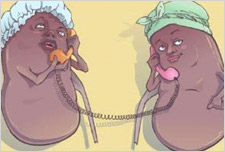How to prevent kidney stones in summer
kidney-stone
30 Apr 2013 (Health Me Up ): In India, approximately 5 to 7 million patients suffer from kidney stone disease and at least 1/1000 of Indian population needs hospitalisation due to kidney stone disease.
 We rarely associate kidney stones with the rise in temperature and humidity. "The incidence of kidney stone cases rises by 40% during summer due to rise in temperature. Climate, temperature and humidity are important factors that contribute to kidney stones," points Dr. Abhinandan Sadlalge, Chief Urologist, RG Stone Urology and Laparoscopy hospital.
We rarely associate kidney stones with the rise in temperature and humidity. "The incidence of kidney stone cases rises by 40% during summer due to rise in temperature. Climate, temperature and humidity are important factors that contribute to kidney stones," points Dr. Abhinandan Sadlalge, Chief Urologist, RG Stone Urology and Laparoscopy hospital.
People who work in a hot environment or have a work routine that does not allow them to have enough water are prone to develop stones. Specifically a 5 to 7 degree temperature rise due to climate change could yield a 30% increase in kidney stone problems. When people relocate from areas of moderate temperature to areas with warmer climates, a rapid increase in stone formation has been observed. There is a known geographic variation in stone disease that has been attributed to regional differences in temperature. The incidence of kidney stone disease is particularly high in areas with dry, hot climate.
Kidney stones are also caused due to dehydration, which too increases due to rise in temperature. This happens when people lose more water through sweating but fail to consume enough water to make up for the lost volume. The water loss eventually leads to higher urine concentrations, which in turn increases the risk of kidney stone formation.
Dr. Abhinandan chalks out 9 steps to prevent kidney stones
1. Drink plenty of water during the day and at night before bed so that your body stays hydrated throughout each 24-hour period. According to Fox News, William Haley, a nephrologist at Mayo Clinic’s Kidney Stone Clinic in Jacksonville, Florida (US), "If you don’t void (urinate) every couple of hours, you’re not drinking enough. You should shoot for producing a whopping 2.5 liters of urine daily."
2. Drink lemonade as this has been shown to reduce the risk of kidney stones
3. Cut back on products with large amounts of oxalate - an acid that can lead to the formation of calcium oxalate kidney stones. These include products like drinking soda, iced tea, chocolate, rhubarb, strawberries and nuts.
4. Cut down the intake of caffeine as it leaves you dehydrated even though you think you are taking in plenty of liquids.
5. Reduce the salt intake and make that a regular habit
6. Ask your physician about medications that can help prevent kidney stones. Medications include those that control the amount of acid, alkali or cystine in the urine - factors that can cause kidney stones to develop.
7. Check your intake of animal protein, including meat, eggs, and fish. These foods contain purines, which are natural substances that metabolise or break down into uric acid.
8. Have more salads as it maintains the coolness levels.
9. Exercise and lose weight and stay healthy.



















